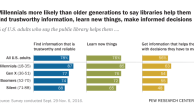
Most Americans – especially Millennials – say libraries can help them find reliable, trustworthy information
Many Americans say they’d benefit from help in finding trustworthy information online, and about eight-in-ten adults say public libraries can help.







